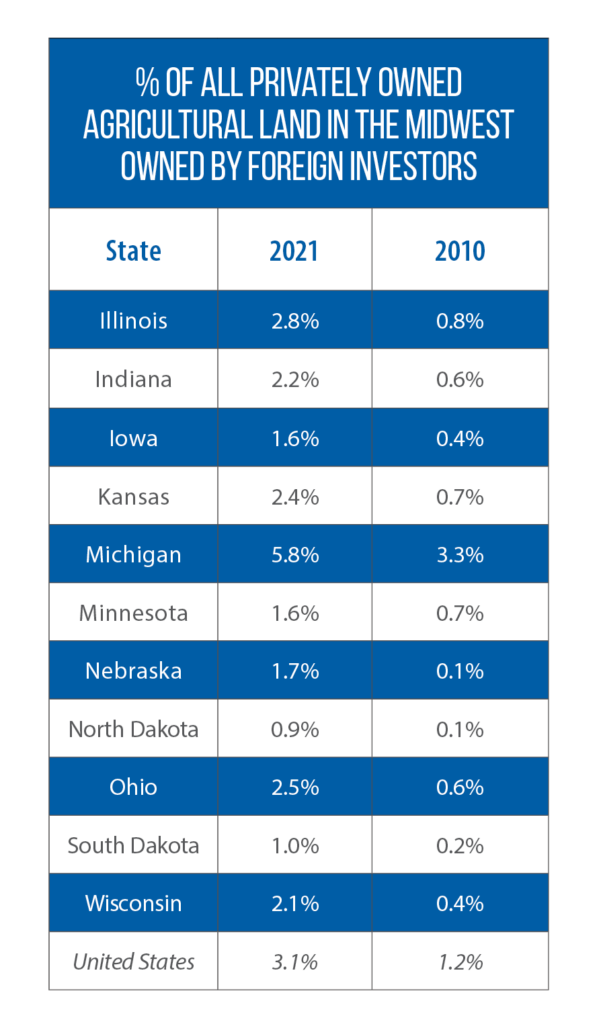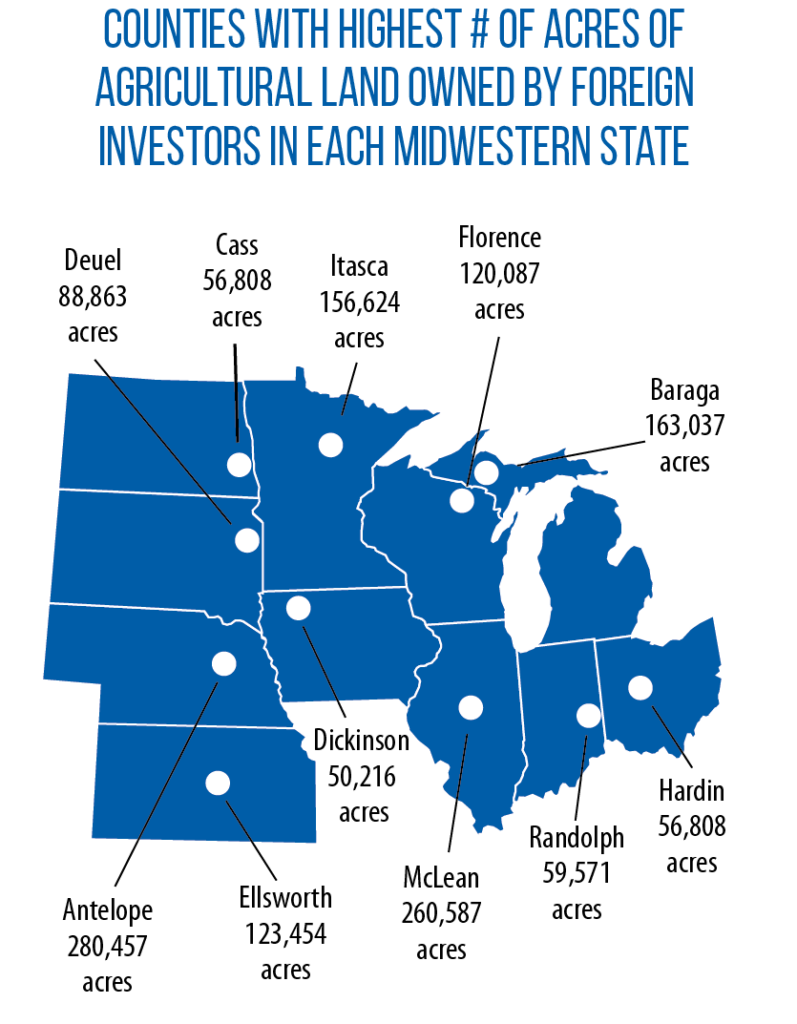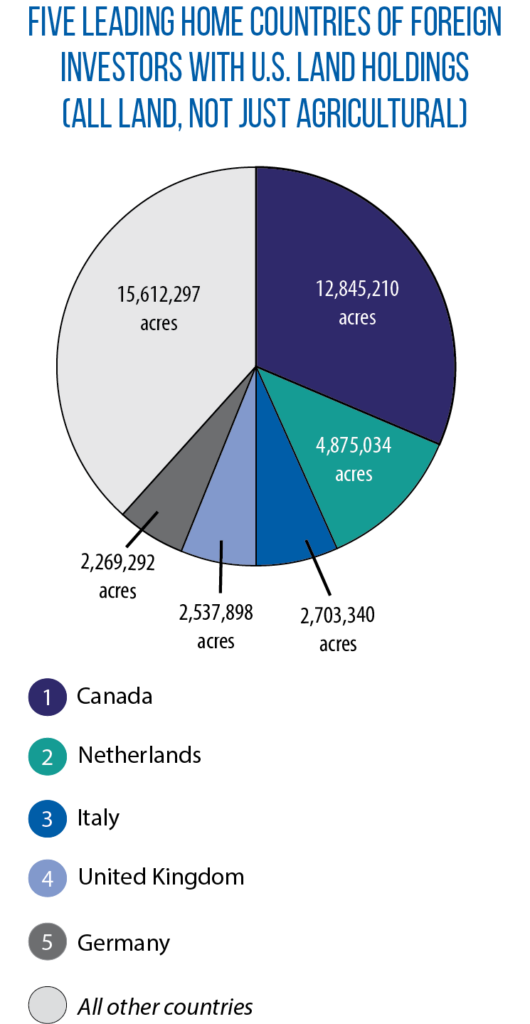Citing food and national security concerns, legislators mull new limits on foreign ownership of farmland
Indiana is one of most recent states to act
Who owns the farmland in America’s heartland?
Since 2015, foreign ownership of U.S. farmland has increased by an average of 2.2 million acres a year, a trend that is getting more scrutiny from the Midwest’s state legislators. “I believe we need to address this issue of foreign land ownership now, before it turns into a food security and national security issue,” South Dakota Rep. Gary Cammack says.
 One idea under consideration in his home state: establish a board that would review proposed purchases of agricultural land and recommend whether the sales should be approved. In advance of introducing the bill for this year’s legislative session, Cammack worked on the proposal in late 2022 with other lawmakers and Gov. Kristi Noem.
One idea under consideration in his home state: establish a board that would review proposed purchases of agricultural land and recommend whether the sales should be approved. In advance of introducing the bill for this year’s legislative session, Cammack worked on the proposal in late 2022 with other lawmakers and Gov. Kristi Noem.
It’s not a new issue for state legislatures.
Forty-four years ago, South Dakota banned foreign residents and governments from ownership of more than 160 acres of farmland. The law, though, did not include corporations, and several foreign corporations now control more than 480,000 acres of South Dakota farmland.
States such as Iowa, Kansas, Minnesota, Nebraska, North Dakota, South Dakota and Wisconsin also have restrictions of some kind that limit foreign ownership or investment in farmland. In Canada, too, Alberta, Saskatchewan and Manitoba limit foreign ownership of agriculture property to small acreage.
Statutory language varies from state to state — for example, how farmland is defined, the types of foreign investors who are restricted under the law (nonresident aliens, foreign corporations, foreign governments, etc.), and the acreage limit set for foreign owners or investors.
Iowa, Kansas and Wisconsin have among the strictest prohibitions on foreign ownership of agriculture land. (Iowa is widely considered to have the nation’s toughest ban.) But even in these states, a foreign investor can use a trust, create a tiered entity, or enter into a partnership with a U.S. business or investor and establish a domestic company that acts as the purchaser.
Indiana has new partial ban on foreign purchases
In 2022, legislation was introduced in several state legislatures to further restrict foreign ownership of land. Few of these measures became law, but Indiana’s SB 388 was an exception. The bill’s sponsor, Sen. Mark Messmer, worked closely with existing Indiana companies to revise the original proposal.
 In its final, enacted form, SB 388 does not completely prohibit foreign business entities from owning all agricultural land, just that used for crop or timber production. Livestock, poultry and research facilities are exempted, thus ensuring the measure wouldn’t impact existing research and genetic seed stock investments.
In its final, enacted form, SB 388 does not completely prohibit foreign business entities from owning all agricultural land, just that used for crop or timber production. Livestock, poultry and research facilities are exempted, thus ensuring the measure wouldn’t impact existing research and genetic seed stock investments.
“That crop ground should be used to supply food and food security to our country first,” says Messmer, who has expressed particular concern about land purchases being made by China. “With an adversary of our country buying and controlling more agricultural land every year, it would eventually also become a national security issue.”
Ultimately, SB 388 passed with only a single dissenting vote. Questions were raised, though, about the exemptions for livestock and research facilities.
“The intent of the bill was to make sure that folks who may not have our food security and best interest in mind are not able to buy and procure that property. If the goal is to ensure food security, we are all of a sudden carving out huge holes in that effort,” Rep. Justin Moed said during legislative hearings on the bill.
As of December 2021, foreign investors owned approximately 40 million acres of U.S. timberland and farmland, representing 3.1 percent of all U.S. agricultural land, according to a December 2022 study by the U.S. Department of Agriculture. That is a 60 percent increase from 2010.
Additionally, many of the largest agricultural companies in the United States are foreign-owned. JBS, the nation’s third-largest meat producer, is a Brazilian company. Smithfield, the fifth-largest meat processor, and Syngenta, the fifth-largest seed and chemical company, are Chinese state-owned. Bayer and BASF, also leading agrochemical and seed companies, are German-owned.
 According to the USDA, Canadian investors own about one-third of the foreign-held agriculture land in the United States. “Foreign persons” from four other countries (the Netherlands, Italy, the United Kingdom and Germany) together hold another one-third.
According to the USDA, Canadian investors own about one-third of the foreign-held agriculture land in the United States. “Foreign persons” from four other countries (the Netherlands, Italy, the United Kingdom and Germany) together hold another one-third.
In some cases, purchases have led to prime farmland not being used for food production. For example, driven in part by federal tax credits, foreign energy companies have purchased the land and then leased it for wind turbines.
Last year, a Chinese company purchased 370 acres of prime farmland just north of Grand Forks in North Dakota. The purchase was made to build a corn wet-milling plant. A Chinese real estate group also bought 130,000 acres in Texas to build a wind farm. These particular purchases raised alarm bells because of the locations, both of which are close to U.S. Air Force bases.
The Grand Forks base, for instance, is central to the Air Force’s drone technology, surveillance and reconnaissance research. The interagency federal Committee on Foreign Investment completed a 45-day review of the purchases in North Dakota and Texas, and did not block either of them. However, in January 2023, the Department of the Air Force said in a letter that the Grand Forks project “presents a significant threat to national security with both near- and long-term risks.” North Dakota’s two U.S. senators have asked the city to discontinue the project.
“We should work together to find an American company to develop the agriculture project and instead work with them to find an American company to develop the agriculture project,” Sens. John Hoeven and Kevin Cramer said.
With these purchases, China would own approximately 1 percent of the foreign-held land in the United States. According to the USDA, China has multiplied its agricultural land purchases around the world by more than 10 times since 2009.
Federal law requires reporting of land buys
Forty-five years ago, U.S. Sen. Chuck Grassley of Iowa helped write the Agricultural Foreign Investment Disclosure Act. Under this law, foreign entities are required to report agricultural land purchases to the USDA. The law calls for foreign entities to be fined for not complying with the reporting requirements. The last such fines were issued in 2014.
The USDA does not currently check for accuracy, and under-reporting is known to be an issue. Federal lawmakers have introduced additional legislation over the last few years requiring additional review of foreign investment. One of Grassley’s concerns is that foreign investors drive up land prices, making it harder for new and beginning farmers. However, the USDA has investigated the overall impact of foreign investment on the rural economy.
Looking at land and rental values in states with restrictions vs. those without foreign limitations, USDA researchers determined in the December 2022 study that there was no significant impact on agricultural land value as a result of foreign investments.
(Note: All graphics on this page come from U.S. Department of Agriculture data)